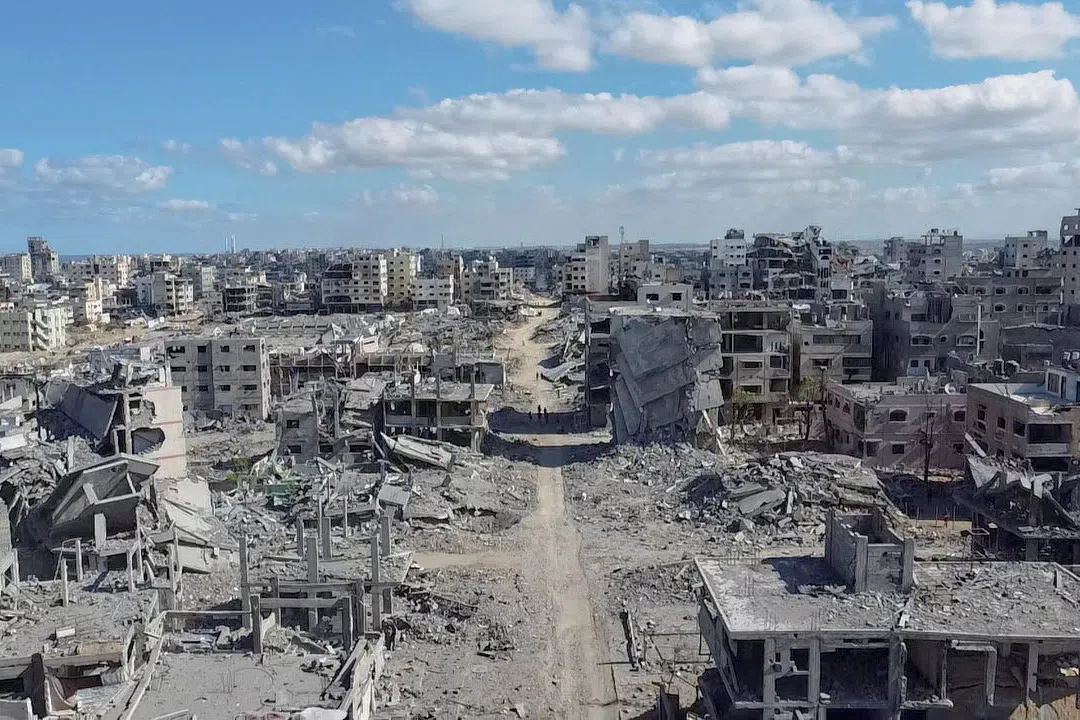Israel strikes Gaza, saying its troops were attacked
Sign up now: Get insights on Asia's fast-moving developments

The Israeli government and Hamas have been accusing each other of violations of a US-brokered ceasefire for days.
PHOTO: REUTERS
JERUSALEM/CAIRO – Israel launched a series of strikes in Gaza on Oct 19 in response to attacks on its forces, the military said, shaking an already fragile ceasefire in the shattered enclave as it traded blame with militant group Hamas for violating the truce.
Residents in Gaza and the local health authorities said that Israeli air strikes and tank fire across the enclave killed at least 11 people.
An Israeli military official said that further strikes against Hamas targets may still be launched, in retaliation for at least three attacks on Israeli troops on Oct 19.
The Israeli military said that its air strikes and artillery fire targeted militants in the southern area of Rafah who had launched an anti-tank missile and fired on its soldiers.
Israeli Prime Minister Benjamin Netanyahu said that he had ordered the military to respond forcefully to what he described as Hamas’ violations of the ceasefire.
Hamas’ armed wing said in a statement that it remained committed to the ceasefire agreement in all of Gaza, adding that it was unaware of clashes in Rafah and that it has not been in contact with groups there since March.
The flare-up was the most serious test yet to the Gaza ceasefire, which took effect on Oct 11, halting two years of war. It further dimmed hopes that the US-mediated truce would lead to a lasting peace.
Defence Minister Israel Katz said the “yellow line” to where Israeli forces had pulled back under the ceasefire would be physically marked and that any violation of the ceasefire or attempt to cross the line would be met with fire.
Rafah crossing to remain closed
The Israeli government and Hamas have been accusing each other of violations of the ceasefire
Hamas issued a statement detailing what it said were a series of violations by Israel that it says have left 46 people dead and stopped essential supplies from reaching the enclave.
On Oct 18, Israel said the Rafah border crossing between Gaza and Egypt would remain closed and that its reopening would depend on Hamas fulfilling its obligations under the ceasefire.
Israel says Hamas is being too slow in handing over bodies of deceased hostages.
Hamas last week released all 20 living hostages
The Rafah crossing has largely been shut since May 2024.
The ceasefire deal also includes the ramping up of aid into the enclave, where hundreds of thousands of people were determined in August to be affected by famine, according to the Integrated Food Security Phase Classification global hunger monitor.
The crossing has in previous ceasefires functioned as a key conduit for humanitarian aid to flow into the enclave.
Although the flow of aid through another crossing has increased significantly since the ceasefire began, the United Nations says far more is needed.
The ceasefire has been touted as the first phase of US President Donald Trump’s plan
Key questions of Hamas disarming, the governance of Gaza, the make-up of an international “stabilisation force”, and moves towards the creation of a Palestinian state have yet to be resolved.
The US State Department did not immediately respond to a request for comment.
Hamas has launched a security crackdown in urban areas vacated by Israeli forces, demonstrating its power through public executions and clashes with local armed clans.
Renewed fighting in Gaza and concerns over the ceasefire pushed key Tel Aviv share indexes down nearly 2 per cent on Oct 19. REUTERS


